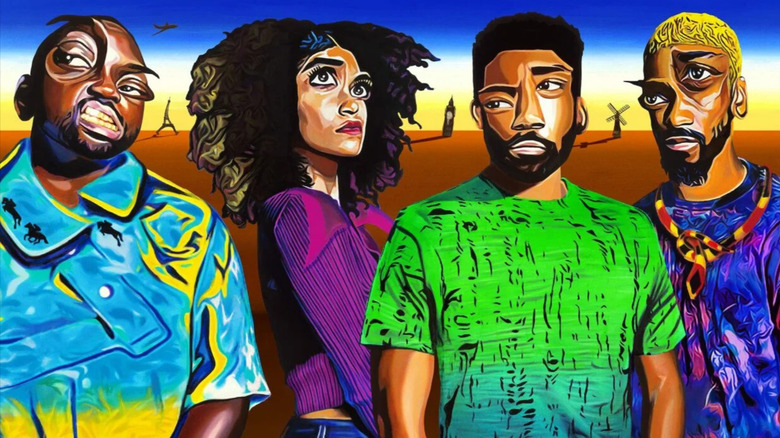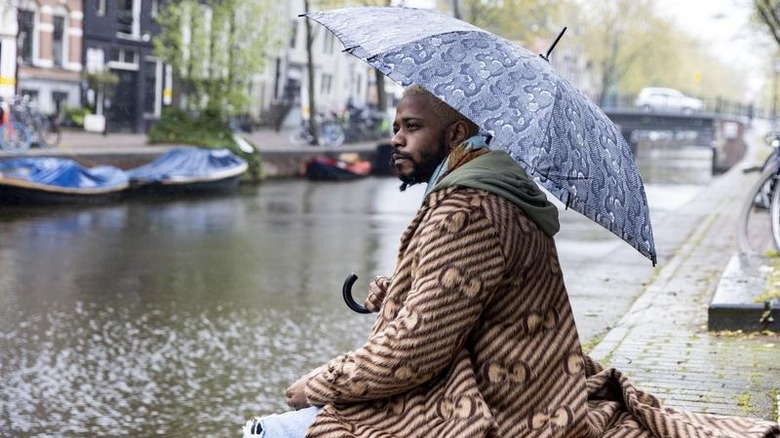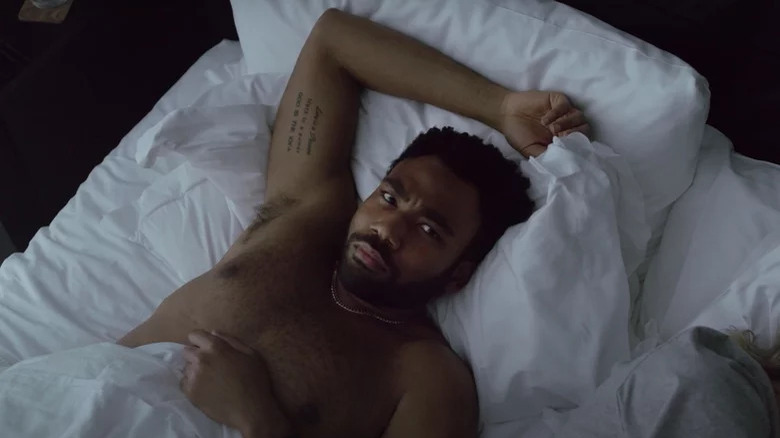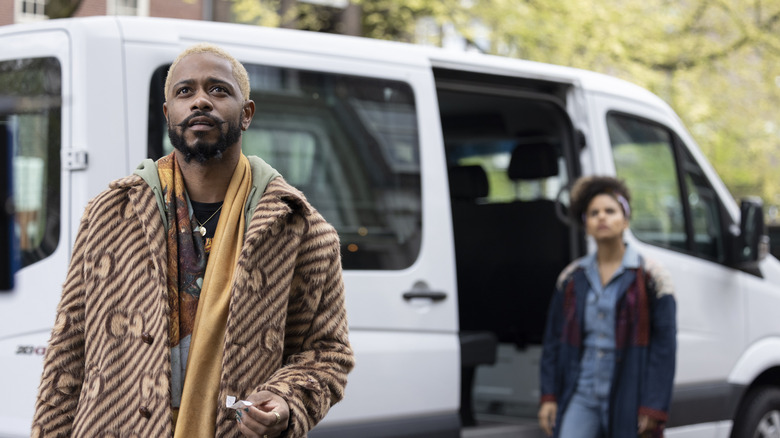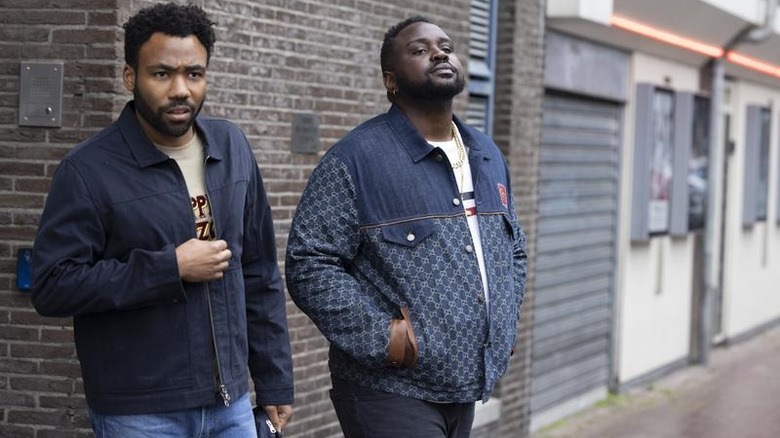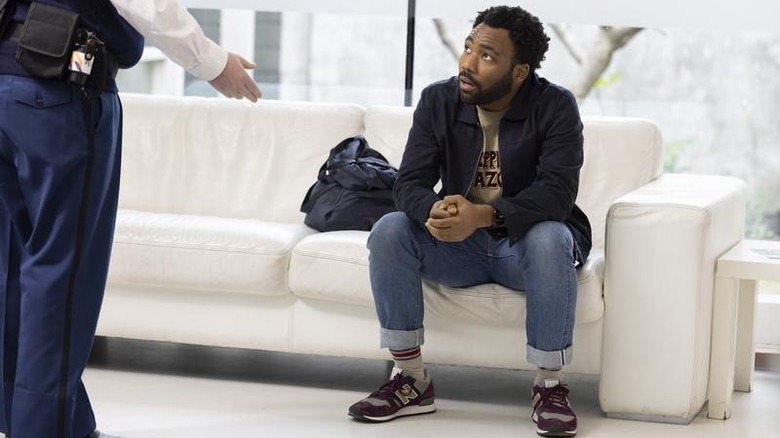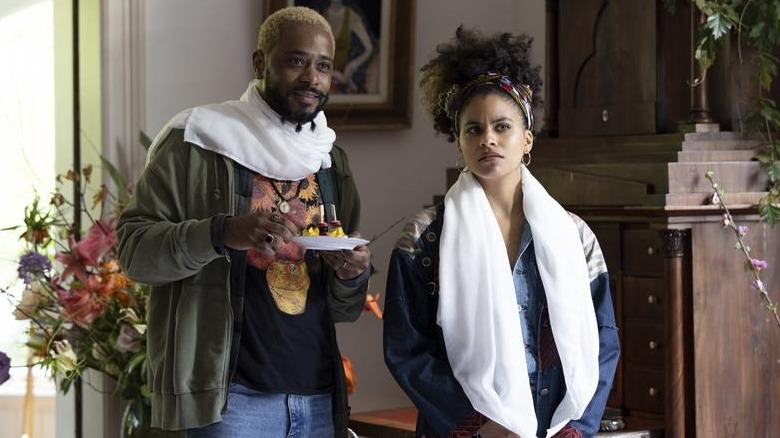Atlanta Season 3 Begins With One Intriguing Misfire And Then Something Much Better
After four years away, the double-stuffed season 3 premiere of "Atlanta" is here, and part of it made me deeply uncomfortable.
This isn't necessarily a bad thing; I'm a fan of the show, and its return has brought us two episodes with extremely different tones. With that said, let's just hop right into recapping what we've all waited a small eternity for, starting with the first episode of the season, "Three Slaps."
Something in the water
The episode begins with a conversation between two friends, one Black, one white, alone at night on the still waters of what I suspect is Lake Lanier, or some fictional place inspired by it given the history lesson that white friend provides. "It's s*** water," he says, before elaborating further:
"This whole lake used to be a town. Houses, farms, roads. There's a whole raceway. Big government built a dam and flooded the place. Anyone who didn't leave drowned. The town was Black too."
He then talks about the nature of whiteness as a social construct, saying the Black people that populated the now-drowned town were "almost white" in that they were wealthy and self-sufficient, stating that people have historically been able to buy into whiteness. Who gets to be considered white has shifted and changed throughout history based on class and convenience, and he says as much to his Black friend, commenting, "There's no scientific basis for it. People just become white. It's social. [...] With enough blood and money, anyone can be white."
This character is essentially driving home the point that the lake is haunted, and by extension, society is also haunted, cursed even by the concept of whiteness and the way it operates, leaving even the privileged "cursed" by its existence. "We're cursed too," he whispers, his face unseen. Then he turns and looks back at his friend, smooth (white) skin in place of his eyes, and repeats it again, much to the horror of his friend who screams "OH S***!" as phantom Black hands reach up from the water and pull him under.
And then the young protagonist of the episode, who is neither Van, Earn, Alfred, nor Darius, wakes up. His name is Loquareeous, and he's a young Black boy who dozed off in class, leading to his Jordan Peele-esque, racially-charged existential horror dream. It looks like the unnamed white classmate in front of him was recording him sleeping, but this doesn't come up again in the episode.
The teacher's announcement that the class will be going on a field trip to see "Black Panther 2" fully awakens Loquareeous, who responds by getting up and dancing. The teacher calls for him to sit down, but he continues, seemingly invigorated by the cheering and encouragement of his classmates. Unsurprisingly, the next scene features him sitting outside of the principal's office with his head in his hands.
Inside the office sits Loquareeous' clearly annoyed mother, his grandfather, the principal, and the white guidance counselor. "First of all, I already told y'all to stop calling me down here," his mother says, indicating that this is far from the first time he's been called to the principal's office. Because the episode is very much about race, it's important to point out that the principal is a Black woman, while the teacher is white. The Black principal attempts to ease the tension by thanking Loquareeous' mother for coming down, but she is cut off by the white guidance counselor, who takes over the meeting. She points out that Loquareeous has been in detention several times for disruptions, and that she feels that perhaps the material in class is too challenging for him, suggesting he be moved to remedial classes.
It's important to note that she doesn't provide actual evidence that he is unable to grasp the material, such as grades, test scores, or homework. She's not even his teacher. She's the guidance counselor. Given this, it's understandable that Mom is not exactly on board with the idea, saying, "My son is not dumb." Obviously, remedial courses aren't an indication that someone is "dumb," but given the context of the situation, her response, however crass, is not unjustifiable. She then states Loquareeous is not the first student to act up in class, and that pushing him back isn't the answer to his disruptions, suggesting that detention will suffice. She exits the meeting, and we see her reprimanding Loquareeous in the hallway by making him dance the same way he was dancing in class, telling him that, "If you don't start using your common sense and acting right, these white people, they're gone kill you. KILL. YOU."
Of course, the guidance counselor sees this and feels it's time to intervene, which leads to her witnessing Loquareeous' grandfather delivering him three not-very-hard slaps across the face. She then leads the young Black boy away, saying, "I'm gonna get you outta there." We later find out that this means she made a call to social services, resulting in a social worker showing up at the family's home, complete with police officers who are "just here as a precaution." Predictably, this does not go over well with Mom, who responds by kicking Loquareeous out of the house.
It's not great, and it just goes downhill from there.
Far from home
Loquareeous is placed into a foster home that is helmed by two self-proclaimed allies, but are actually crunchy granola moms who are extremely, horrifically racist. He is first greeted by Amber, who immediately calls him "son" and introduces all of the other Black foster/adopted children as his brothers and sisters. Amber insists that he call her "mom." As a Black person, I knew things were going to be bad — because, in addition to the overly familiar welcome, the hair of the other children wasn't properly done. I'm not explaining why that's such a red flag because it's an article's worth of cultural analysis in and of itself, but if you know, you know. From there, Loquareeous is made to endure a slew of increasingly appalling racism with heaps of child abuse thrown on top.
When Amber's wife comes home, it becomes clear that the episode is drawing heavily on the story of the Hart Family Massacre. For those unfamiliar, in 2018, two white women with a history of documented child abuse committed murder-suicide by loading up their car with their six Black adopted children and themselves and then driving it over a cliff. One of the children's bodies, that of Devonte Hart, was never recovered. The episode mostly follows the same series of events as its tragic, real-life inspiration, down to recreating the viral photo of Devonte Hart hugging a police officer, which made national news.
In 2014, when the photo went viral, it was accompanied by a story that Devonte — who was holding a "free hugs" sign — was "sad" about national news, referring to the extrajudicial killing of Michael Brown, the failure of the law to prosecute the officer who murdered him, and the resulting protests. In response, a police officer gave him a hug. In reality, Devonte and his siblings were being used as pawns by Sarah and Jennifer Hart in their disturbing attempts to play the ultimate white saviors. We see this same thing play out in "Three Slaps" with their fictional counterparts when they force Loquareeous and the other children to perform at the farmers market, singing and dancing and holding a "free hugs" sign. They also deny the children medical care and food and force them to work the "farm" in their backyard. You know, like f***ing slaves. Much of this is ripped straight from the real-life story.
Just as in real life, the deceptive photo made the news with a fabricated feel-good story to accompany it. Loquareeous exclaims that he didn't say the things that are being reported on, to which Amber very creepily replies, "I'm going to love that pride out of you." Gale, on the other hand, tells Loquareeous that he's a snitch, and that their home is better than where he came from. This, of course, is insanely untrue — and very clear to viewers at this point.
Eventually, a Black social worker stops by — one who isn't accompanied by police officers "just as a precaution" — and is immediately alarmed by the obvious abuse. I mean, these people don't even have washcloths! They also insist on calling Loquareeous "Larry" because they don't feel his name — or his identity as a Black child — is worth learning or protecting. There are also other clear signs indicating a severe lack of real care for the children left in Amber and Gale. It seemed like the day would be saved, but alas, Gale gets rid of the would-be heroic Black lady social worker offscreen, and we're never told what became of her — although it's heavily implied that Gale murdered her, as evidenced by Loquareeus dreaming of finding her severed head soaking in a homemade pickle brine inside the couple's fridge. Spaghetti for breakfast doesn't seem so bad in hindsight.
That night, Loquareeous dreams of his mother's warning that if he doesn't shape up, white society will not care, and will actively take part in his demise. Her words are proved gut-wrenchingly true when Gale and Amber plan a fatal road trip for everyone. Loquareeous is rightfully suspicious of their motives and manages to escape the car just seconds before it glides off of the road, with Gale, Amber, and the other children still inside. Their dog is also in the car, even though Gale and Amber made a notable effort to try and spare his life, regarding it as somehow more valuable than the lives of the children they planned on murdering in their sick scheme. In the scene before the deadly trip, Gale and Amber have a revealing conversation during which Amber cries and asks why nobody ever bothered to stop them before things got out of hand. The answer, of course, is white supremacy and racism, which gives even the most blatantly and boldly horrific white people the benefit of the doubt while seeking to villainize, patronize, dismiss, and undermine well-intentioned Black people and other non-white people at every turn.
That's the reason why Loquareeous ended up in this whole unfortunate mess, isn't it? It began with a white guidance counselor escalating a situation that could have and should have been handled differently.
Loquareeous makes his way back home to his mother, who has no idea what he's endured. He has a newfound appreciation for her and his home, and we find out that the children who were in the car all survived, which is a much less tragic ending than the real-life story in which all six children were murdered, their lives taken by their ultimately malevolent adoptive parents.
In the end, though, we learn that the events of "Three Slaps" were all a dream. Earn wakes up in bed beside a white woman, and the credits roll.
Before I recap episode two...
I'm not going to lie and say that I enjoyed "Three Slaps" — because I really didn't. I found it hard to watch, especially as someone who almost immediately recognized the episode's source of inspiration. Being uncomfortable doesn't mean it was bad, however. For all my unease, I found it bold and provocative, but maybe too heavy-handed in alluding to its inspiration. To point out the obvious, yes, there are some heavy Jordan Peele "Get Out" vibes, though I'd argue the episode is a little less successful in its attempt to highlight the simultaneously blatant and insidious way racism offers unlimited benefit of the doubt to white people while assuming the worst of Black people. I think this lies in the way the Loquareeous' mom was, and was not, portrayed. Maybe it's because I'm more sensitive to the predominantly negative depiction of the Black women in the media, including "Atlanta," making it far less palatable to see yet another instance of the "angry Black woman" trope being evoked yet again, but maybe that's the point.
If I'm giving the writers the benefit of the doubt here, maybe we're supposed to react somewhat negatively to Loquareeus' mom at first. The way she comes off as dismissive and harsh initially rubbed me the wrong way, and I suppose that same reaction could lead some viewers to believe that maybe he does need the guidance counselor's help, only to realize as the show progresses that her impatience with white people and their perceptions is justified.
Could she have been portrayed as less of an angry stereotype while still preserving the intended impact and point of the episode? Yes, I believe so. I still take issue with this one-sided and often inaccurate portrayal of Black motherhood as being thankless and miserable, but when compared with the seemingly nice white women who were "kind" and "soft" with their words while being abusive, delusional sociopaths, she's really not a villain at all — just tired and justifiably mistrustful of superficial white "benevolence." I guess it's just that I don't trust certain audiences to have that takeaway.
We could have gotten the message without her forcing him to dance (which I didn't personally find funny, sorry), without her kicking him out, and without her coming off as so frustratingly dismissive. In the end, some people may think she's just the "lesser of two evils," which I hope isn't the point. There's also the fact the episode dedicates an entire scene to letting Gale and Amber justify and express remorse for their horrific actions, while we don't get that with Loquareeous' mom, especially not in such a direct way. The end result of this weird narrative choice looks like an attempt to humanize abusive white murderers even as their actions are condemned, while simultaneously denying the frustrated Black mother that same grace. We don't even get any real indication that Loquareeous' mom missed him, was worried for him, or regretted kicking him out. I guess that's where it's a bit of a misfire for me.
Sinterklaas is Coming to Town
Luckily, the very next episode, "Sinterklaas is Coming to Town," is far less depressing and didn't cause my misogynoir detector to start beeping the way past episodes like "Champagne Papi" have. The episode picks up immediately where "Three Slaps" has left off. Earn is still in the hotel with the white girl, and he's overslept. He has also missed several text messages from Van and Al/Paper Boi. Van has landed in Amsterdam unexpectedly, and Al needs $20,000. He calls Darius, who is characteristically high as hell, and asks him to pick up Van. Meanwhile, he makes his way over to the venue where Paper Boi will be performing later.
Speaking of Paper Boi, it looks like things have really picked up for his rap career in the time that has passed. At the end of season 2, he was an opening act, and now he's a headliner with a dedicated fanbase, set to perform in another country. He's also in jail, but it turns out jails in Amsterdam are pretty nice. While he waits for Earn to pay his bail and pick him up, he makes small talk with a prison guard and orders a tasty lunch. When he's informed that Earn has already paid his bail, he decides to stay and finish his lunch. Afterwards, he leaves with Earn, and things are going well — save for one thing.
The timing of Paper Boi's performance is pretty unfortunate as it takes place during the country's traditional Sinterklaas celebration, which means lots of people are walking around in blackface, dressing up like the character "Zwarte Piet," which translates to "Black Pete." When Earn and Paper Boi see a small child decked out in full Zwarte Piet regalia, Earn asks, "Hey, what's with all the blackface?" to which their car driver responds by explaining the Zwarte Piet character and blackface tradition, saying that Piet is basically "Santa's helper" and claiming that he's only "black" because he's covered in soot, implying that he isn't supposed to be a Black person. Plus, he passes out candy, and who doesn't love candy? Earn says that he "sounds like Santa's slave," but that he "appreciates the rebrand," while Paper Boi is not even trying to entertain the "it's just soot" explanation. I'm all for understanding cultural differences, but there's a limit, and Paper Boi's dismissal is completely understandable. I mean, how does soot account for the curly afro hair and red lips that also tend to come with the costume?
You f*** me, man?
Back at the hotel, Earn learns that a threesome gone awry is what landed his cousin in jail. The night before, Paper Boi brought two women (one Black, one white, both native to the country) back to his hotel room for a ménage à trois, only for things to go horribly wrong. The white woman mentions Sinterklaas and the Black woman mentions how the tradition is racist, which is likely a reference to the whole Zwarte Piet thing. She also mentions other racist things in the country, like how a Dutch magazine called Rihanna a racial slur in 2011. Yeah, that really happened. The white girl responds by saying it's not racist, it's a compliment. She then says the slur again, which leads to the women fighting and trashing the hotel room, with Paper Boi taking the fall since he's the one who went to jail for it (even if it was a nice jail).
As if things haven't been uncomfortable enough, Paper Boi ultimately decides to cancel his performance after catching a glimpse of the many adoring fans who have decided to show up to his concert in their Zwarte Piet outfits. It's more than fair for a Black man to decide he's not going to go out and perform for an audience of people in blackface, so Earn doesn't even try to argue.
When Earn informs the event organizer that Paper Boi won't be performing, claiming that he caught the same illness that has caused Earn to cough and sneeze and sniffle throughout the episode. He also explains that insurance will cover everything, so there's no financial loss. Unfortunately, the event organizer is not understanding of any of this, and responds by saying "You f*** me, man?" and vows to destroy Earn even after being assured that he is not trying to f*** anyone.
In one of the funniest scenes of the entire episode, Earn makes a run for it, quickly lost in a sea of white people in blackface. As a result, the event organizer mistakes one of these white people for Earn, and proceeds to beat the s*** out of him, saying, "Why do you make me do this to you, Earn?" with an apologetic sincerity even as he's kicking this painted stranger's ass. It's terrible. It's hilarious.
Van, Darius, and Tupac
In addition to Earn and Paper Boi's adventures with racism in a country that is foreign to them, we also get to see Van and Darius go on an adventure of their own — and they get to see Tupac die. At least, the guy looks a lot like Tupac. It turns out that Van came to Amsterdam to "figure things out" after a career disappointment. The fact that she has the money to just take a flight to Amsterdam on a whim is a further indication that everyone is much more financially well off than they were in season 2, when their financial status was a point of contention. After some uncomfortable small talk, Darius and Van go on a shopping trip to get Van a new coat since her luggage was lost. She's very chill about her lost luggage — another sign of financial security that I personally have yet to experience. She finds a piece of paper with an address written on it, and Darius tells her it's destiny. The two go to the address, which leads to them loading into a van full of white people who look like "Midsommar" extras.
They end up at what appears to be a funeral, but the would-be cadaver is still alive. At first, it seems as though something touching and life-changing is about to happen for Van, who is there trying to figure herself out. And I guess it is life-changing, in a way. Darius mentions that he thinks the "sick" person everyone is there to help "transition into the next life" is Tupac because of a conspiracy theory that the rapper faked his own death. Van doesn't believe him, but when she approaches the man, he definitely looks like Tupac. Before she has a chance to process this, a rubber sheet descends over him, violently suffocating him. Everyone is calm, save for Van who is understandably freaked out. "Hail Mary" begins to play, further alluding to the Tupac conspiracy theory.
The episode ends with Van and Earn running into each other in the hallway of the hotel where they're staying. Earn is looking visibly sick at this point, and the two exchange pleasantries before going into their respective hotel rooms. Earn collapses onto his bed, only to have his rest interrupted by Al, who texts that he's hungry and needs, "300 pieces of fried chicken. All legs."
And then the credits roll.
Be sure to follow Slashfilm for more weekly recaps of "Atlanta," as new episodes air on FX and Hulu.
